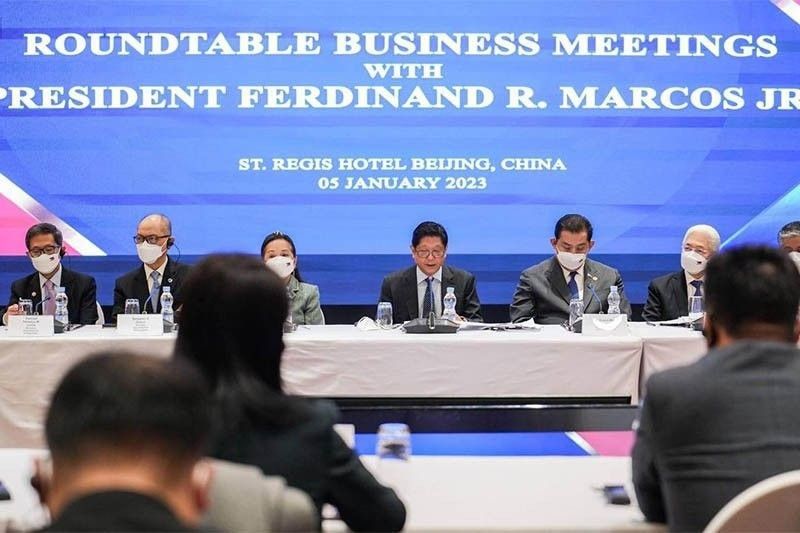Marcos secures deals with China for lower fertilizer prices

MANILA, Philippines — Two business deals signed with Chinese firms during President Marcos’ state visit in China would help lower fertilizer prices and ensure food security in the Philippines, Malacañang said yesterday.
In a statement, the Presidential Communications Office (PCO) said two fertilizer manufacturing companies in China signed a cooperation agreement with state-run Philippine International Trading Corp. (PITC) to “ensure sustainable supply of the much-needed fertilizers at reasonable prices.”
Marcos “expressed appreciation” over the deal during a roundtable discussion with business leaders in Beijing last Jan. 5. “We look forward to a steady supply of fertilizer inputs needed by our farmers through these agreements,” the PCO quoted him as saying.
The President, who is also agriculture secretary, lamented how the cost of farm inputs, especially fertilizers, has “become prohibitive and unaffordable for our local farmers.”
“Providing sustainable and affordable supply of inputs such as fertilizers and seedlings has become more difficult, given global economic challenges, as we have all seen in the supply chain problems that we have encountered,” he said.
One of the strategies to address the problem is to establish cooperative agreements with suppliers for the government to buy these inputs in bulk and sell them to farmers at a lower price.
Earlier, Marcos had revealed plans to buy cheaper fertilizers through government-to-government deals and among the countries eyed to supply the need were China, Malaysia, Indonesia, Russia and the United Arab Emirates.
During his visit to China, the Philippines also secured $2.09 billion (about P110 billion) in purchase intentions for fruits like durian, coconut and bananas.
Economic rebuilding
At the same meeting, Marcos claimed that the Philippines’ economic fundamentals “remain strong and have been steadily improving.”
“I assure you that the Philippine government is committed to support your business activities in the country. The Philippine economic management team, including the Department of Agriculture, will serve as your focal points of contact for any concerns regarding doing business and expanding your commercial footprint in the Philippines,” he told Chinese business executives.
The President also invited Chinese businesses to look at the Philippines equally “as a valuable contributor to their global businesses and as a partner in rebuilding the economies of both our countries.”
“Our partnership is critical in adapting and recovering from the pandemic. So together, I think that we can build a more resilient and sustainable economy,” he said.
Trade Secretary Alfredo Pascual, who was at the meeting, called on business leaders to “firm up your interest to make an investment destination in the Philippines for plantation development and building of processing facilities.”
Pascual cited the expansion of the country’s market reach as well as its participation in the Association of Southeast Asian Nations (ASEAN) Trade in Goods Agreement, the ASEAN-China Free Trade Area and other agreements of the regional bloc.
“The Philippines is a highly promising production base for agribusiness, a source also of products for export to China… Let us make more agribusiness investments happen in the Philippines,” he said.
In an interview, the trade chief said more Chinese investors coming to the Philippines would mean more jobs, enhanced foreign exchange earnings and lower cost of agricultural output.
“The immediate impact for Filipinos will be jobs because the importers would be buying products that are produced in the Philippines and the companies that are producing them will have to rev up or increase their production,” Pascual said.
The Philippines and China signed 14 agreements covering areas like agriculture, energy, infrastructure development, people-to-people exchanges and tourism before Marcos returned to Manila.
Socioeconomic Planning Secretary Arsenio Balisacan said the agreements are expected to support the administration’s Philippine Development Plan (PDP).
“So it’s very promising again to say that PDP will be in a way supported by thrust like this and we need to move fast again. As I said, move fast, seize the opportunities, get our houses in order. We have so many things to fix,” Balisacan said.
“But of course, it’s chicken and egg. Those things that need fixing will require a lot of investment, energy and infrastructure. But we also need investments that create jobs, manufacturing, tourism, agribusiness, logistics. These are what the Chinese are bringing to the table,” he added.
- Latest
- Trending





























